How to Separate Personal and Business Calls
Mixing work and life on one phone leads to chaos. The smarter move is to separate personal and business calls with Supa Dial. Get a second number that protects your privacy, keeps calls organized, and makes your business look professional.

Your phone is your command center. One minute it’s buzzing with a client request, the next it’s your mom asking what’s for dinner. When personal calls and business calls collide on the same line, chaos wins. Deadlines blur, boundaries vanish, and that professional image you’re building? It starts to look shaky.
The truth is, you don’t need two phones to keep your world in order. You just need a smarter way to draw the line between life and work. That’s where separating personal and business calls becomes a game-changer. Whether you’re running a side hustle, building a startup, or just tired of after-hours pings, a dedicated business number is the ultimate boundary-setter.
With tools like Supa Dial, you can keep every call in its lane. Personal life stays personal, business stays business, and you get back the headspace to actually enjoy both. This guide shows you exactly how to make it happen.

Why Personal and Business Calls Should Never Mix
Mixing work calls with personal ones might sound harmless at first, but it’s a fast track to stress, lost opportunities, and even security risks. Whether you’re a freelancer, small business owner, or side hustler, using one number for everything creates problems you can’t always see right away. Here’s why keeping them separate is more than just a convenience; it’s a must.
Professionalism Takes a Hit
When every call goes through your personal line, it’s impossible to tell if it’s a client, a friend, or spam. That lack of separation makes you look less reliable, especially when business calls compete with everyday chatter.
Imagine a client hearing your kid in the background while you’re trying to confirm an invoice. A dedicated business number instantly gives you authority and shows people you take their time seriously.
Your Privacy Is on the Line
Sharing your real number is like giving strangers a spare key to your front door. Once it’s out there, anyone can use it, share it, or even sell it. For professionals handling sensitive details like addresses or payments, this risk is more than annoying; it’s a liability.
Keeping personal and business calls separate shields your private life and gives clients confidence that their info is safe.
Boundaries Disappear Fast
When your phone doubles as a business line, downtime vanishes. Clients call during dinner, texts roll in while you’re off the clock, and suddenly you’re never truly “off.”
That nonstop availability isn’t sustainable, and it leads to burnout and resentment. A separate line lets you clock out, recharge, and show up fresh for every shift, every client, every project.
Spam Multiplies Overnight
Put your personal number on a flyer or a website, and it’s fair game for spam bots. Before long, your phone buzzes more with robocalls than with friends. Each ring pulls you away from what actually matters, wasting energy and time. A second line acts as a filter, keeping business opportunities front and center while spam gets left at the door.
Old-School Fixes That Don’t Work Anymore
Back in the day, juggling personal and business calls meant coming up with hacks that kind of worked, but mostly just made life harder. Some people doubled up on devices, others leaned on apps that weren’t built for serious work. Those quick fixes might have been clever at the time, but today they’re outdated, clunky, and more of a headache than a solution. Here’s what you should stop relying on.
Carrying Two Phones
There was a time when having a “work phone” and a “personal phone” was the mark of success. In reality, it’s like lugging around an extra brick everywhere you go.
Twice the chargers, twice the pocket space, and twice the chance of leaving the wrong one at home. If you’re on the move, this approach drains more energy than it saves.
Burner Apps With Limits
Cheap burner apps promised quick relief, but the cracks show fast. Limited minutes, unreliable call quality, and numbers that vanish if you stop paying make them a bad fit for real business use.
They were never designed to be your permanent solution. If you need something professional and consistent, this shortcut won’t cut it.
Messaging Apps in Place of a Phone Line
Some people try to use apps like WhatsApp, Messenger, or even Instagram DMs as their main business line. The problem? Not everyone is on the same platform, and those apps aren’t designed to replace a phone.
Calls drop, messages get buried, and you look less professional than the competition. Clients expect a number they can dial, not a scavenger hunt for your inbox.
Screening Every Call Manually
Answering only the numbers you recognize and letting everything else hit voicemail sounds smart in theory. But in practice, it means constantly juggling missed calls, second-guessing who to answer, and wasting time chasing voicemails.
Worse, you risk ignoring real opportunities because you assumed an unknown number was spam. This system isn’t just stressful, it’s unreliable.
The Modern Solution: A Dedicated Business Number
The old tricks are out. Today, separating personal and business calls doesn’t mean carrying extra devices or putting your number on blast. The smarter play is getting a second number that works exactly how you need it to: flexible, private, and built for the way you run your life. Here are the most effective options on the table.
Virtual Business Numbers
A virtual number is the gold standard for anyone serious about separating calls. Instead of needing another SIM card or phone, you get a new number that runs through an app. Every call shows up labeled, so you instantly know if it’s business or personal.
With Supa Dial, you also get extras like voicemail, SMS, call routing, and auto-replies, so you look professional even when you’re off the clock.
Encrypted Second Lines
For roles where privacy is non-negotiable, like therapists, legal advisors, or even contractors handling sensitive client details, encrypted second lines give an extra layer of protection.
They keep your conversations secure while still giving you the freedom to take calls from anywhere. Supa Dial includes secure messaging features so your client data isn’t floating around in risky places.
Temporary or Disposable Numbers
Sometimes you don’t need a forever line, you just need something short-term. Maybe you’re listing a rental, testing a new business idea, or running a limited-time gig. Disposable numbers are perfect for keeping your real number private during those one-off situations.
Just remember: they’re not meant to replace a real business line long-term. For building trust and professionalism, consistency matters more than quick fixes.
How to Separate Personal and Business Calls in 3 Easy Steps
Setting up a second line doesn’t need to feel like rocket science. With the right tools, you can have everything running in minutes and finally stop mixing personal chatter with client calls. Here’s how to make it happen.
Step 1: Choose Your Second Number
Pick the right type of number for your situation. A virtual business number (like Supa Dial) gives you instant professionalism without the hassle of a second phone. If privacy is the top priority, you can go encrypted.
And if you’re testing something short-term, grab a temporary number to shield your personal line. The key is consistency, as clients should always know which number to call.
Step 2: Customize Your Setup
Once you’ve got your new number, make it yours. Set a voicemail that sounds professional, not like the generic “You’ve reached…” recording. Create business hours so late-night calls roll into voicemail instead of waking you up.
And use caller ID so you instantly know whether it’s a client or your cousin. Supa Dial makes these tweaks dead simple. You’ll look more put together with almost no extra effort.
Step 3: Use It Everywhere
Your second line only works if people actually use it. Add it to your website, invoices, social profiles, and email signature. Tell clients this is your official business number so they don’t fall back on your personal one.
Over time, it becomes the go-to contact channel, and your personal phone gets its peace and quiet back.
Best Tools to Manage Personal and Business Calls
There are more ways than ever to add a second number, but not every tool is built the same. Some are designed for solo pros, others for enterprise teams, and a few are really just stopgaps. Here’s how the top options stack up.
Pricing and features are based on provider websites as of August 2025 and may change over time.
Why Supa Dial Stands Out
While the other tools have their place, Supa Dial is made for people who want a professional second line without the complexity of enterprise software or the risks of disposable apps.
It is quick to set up, easy to manage, and flexible enough to grow with your business. You get the right balance of privacy, professionalism, and control, all in one app.
Who Benefits From Separating Calls
The truth is, almost anyone who blends work with personal life on one phone can benefit from a second number. Whether you are running a small shop, freelancing full-time, or juggling multiple side hustles, the line between business and personal should never be blurry. Here are the fields where a separate number makes the biggest impact.
- Freelance and Creative Work
Designers, writers, coaches, and other independents can look more professional while keeping client calls separate from their personal lives.
- E-commerce and Online Selling
From Shopify sellers to marketplace vendors, a second number helps keep customer inquiries organized and avoids turning personal phones into call centers.
- Home and Field Services
Contractors, cleaners, repair techs, and service providers rely on fast responses. A dedicated line makes every call professional and ensures no job lead is lost.
- Childcare and Personal Care
Babysitters, nannies, and caregivers need to stay reachable without losing their privacy. A business line sets boundaries that both families and workers respect.
- Hospitality and Rentals
Airbnb hosts and other short-term rental owners need to communicate quickly with guests while protecting their private numbers.
- Media and Public Personalities
Influencers, bloggers, and voiceover artists benefit from having a polished channel for brand deals and collaborations, without mixing it with personal calls.
- Small Business Owners
From local shops to solo entrepreneurs, a second line keeps daily operations organized and builds trust with new customers.
Tips for Keeping Your Phone Life Organized
A second number sets the foundation, but how you manage it day to day is what really makes life easier. These simple hacks help you stay in control so your phone never feels like it is running your life.
Image Placeholder: Happy professional at a desk with one phone and coffee, not stressed.
Assign Unique Ringtones
Give your business line its own sound so you know instantly if it is work or personal. No more guessing who is on the other end before you pick up. That split-second clarity keeps you from missing opportunities or mixing up calls.
Set Clear Business Hours
Your business number should respect your downtime. Set up rules so after-hours calls go straight to voicemail, and auto-texts let clients know when you will respond. This keeps your boundaries firm and helps you recharge.
Always Share the Right Number
Make your second line the default everywhere. Add it to your website, business cards, email signature, and invoices. When clients only have your business number, you keep your personal life protected.
Use Auto-Replies to Stay Professional
Even if you miss a call, you do not have to leave people hanging. A quick auto-reply shows you are on top of things and sets expectations for when you will call back. It is a small touch that makes a big difference in client trust.
Review Your Call Logs Weekly
A quick check-in on your business line helps you spot missed calls, follow up with leads, and keep track of patterns. It is the easiest way to stay organized without letting important conversations slip through the cracks.
How to Set Up Your Line with Supa Dial
Setting up a second line should not feel like another full-time project. Supa Dial makes it quick so you can keep your focus on what matters most.
1. Visit SupaDial.com and sign up or log in
Create an account in just a few clicks. If you already have one, simply log in to your dashboard.
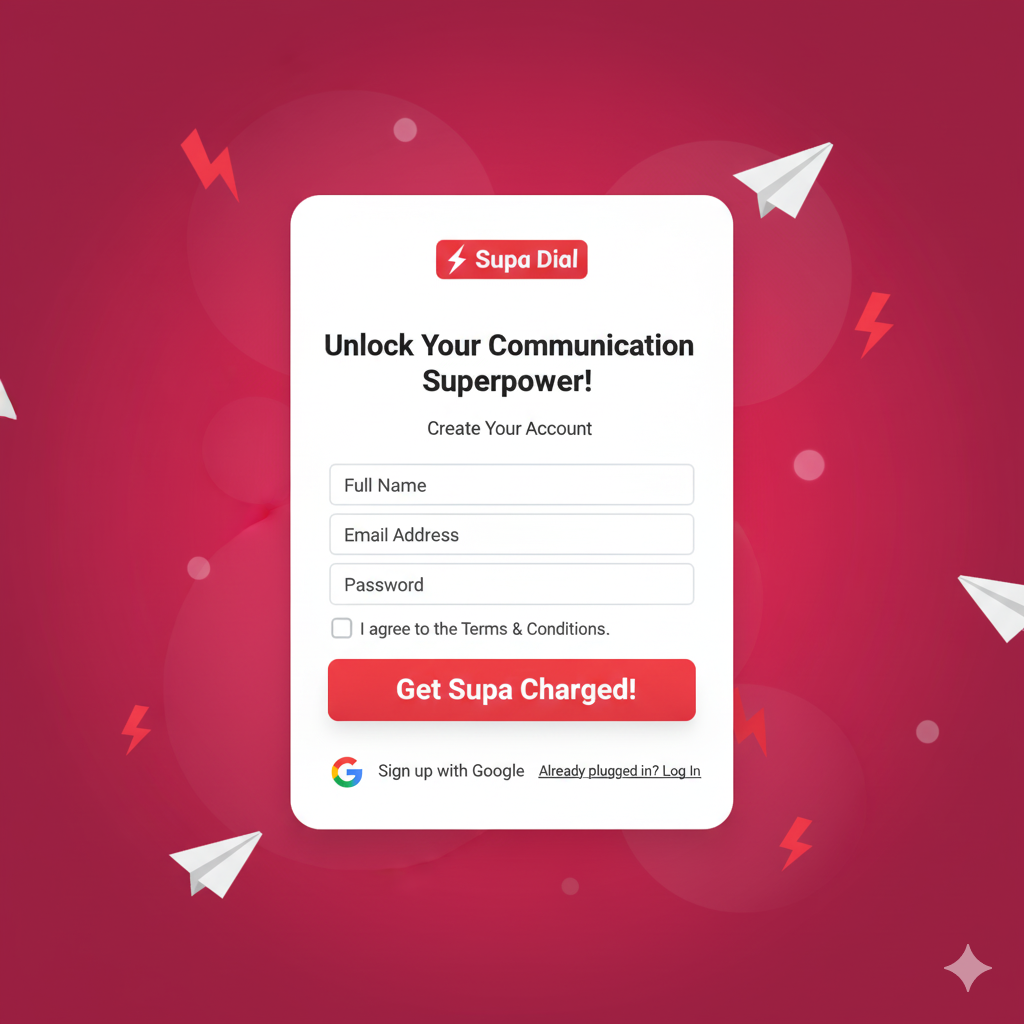
2. Choose your preferred number
Select a local or international number based on where you plan to use it. You can opt for a mobile or landline format depending on your needs.
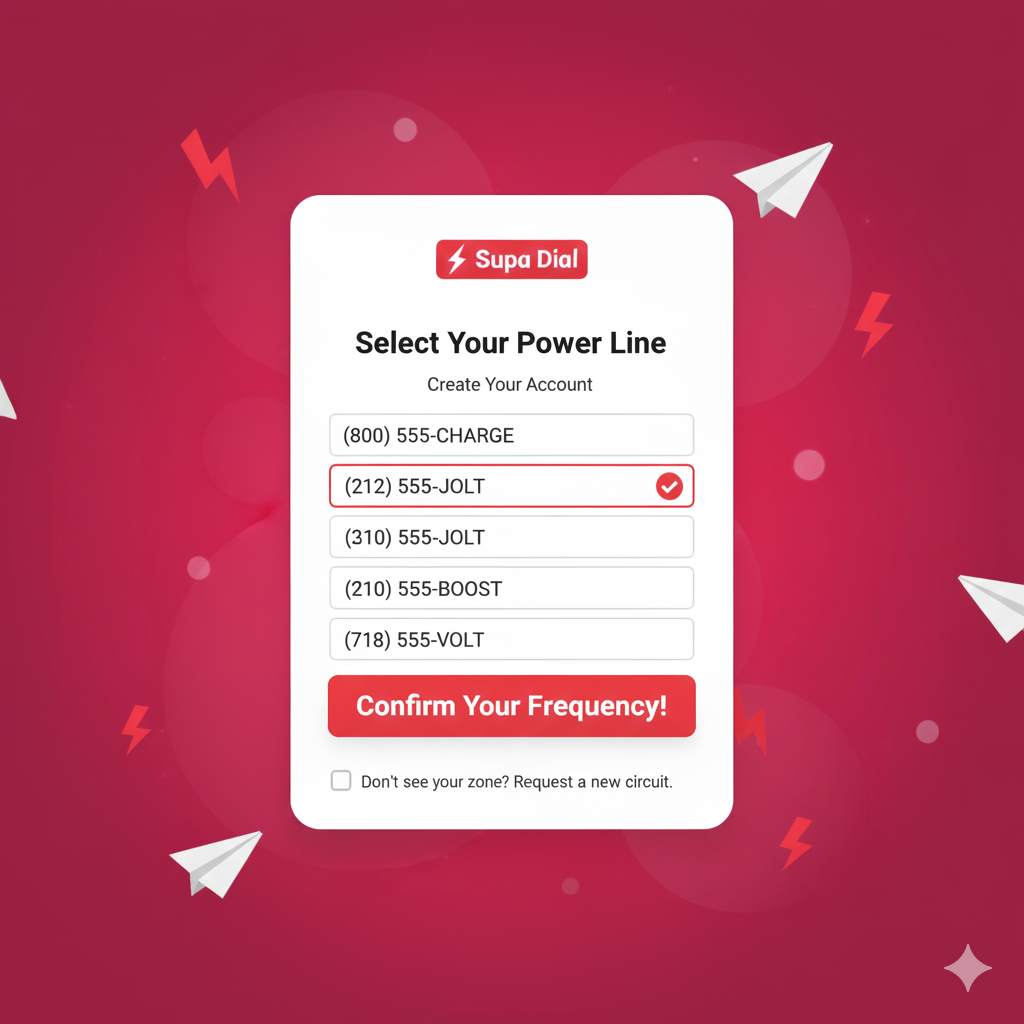
3. Pick your plan
Match your choice to your expected usage, whether that’s a basic plan for occasional calls or a more feature-rich option for frequent communication.
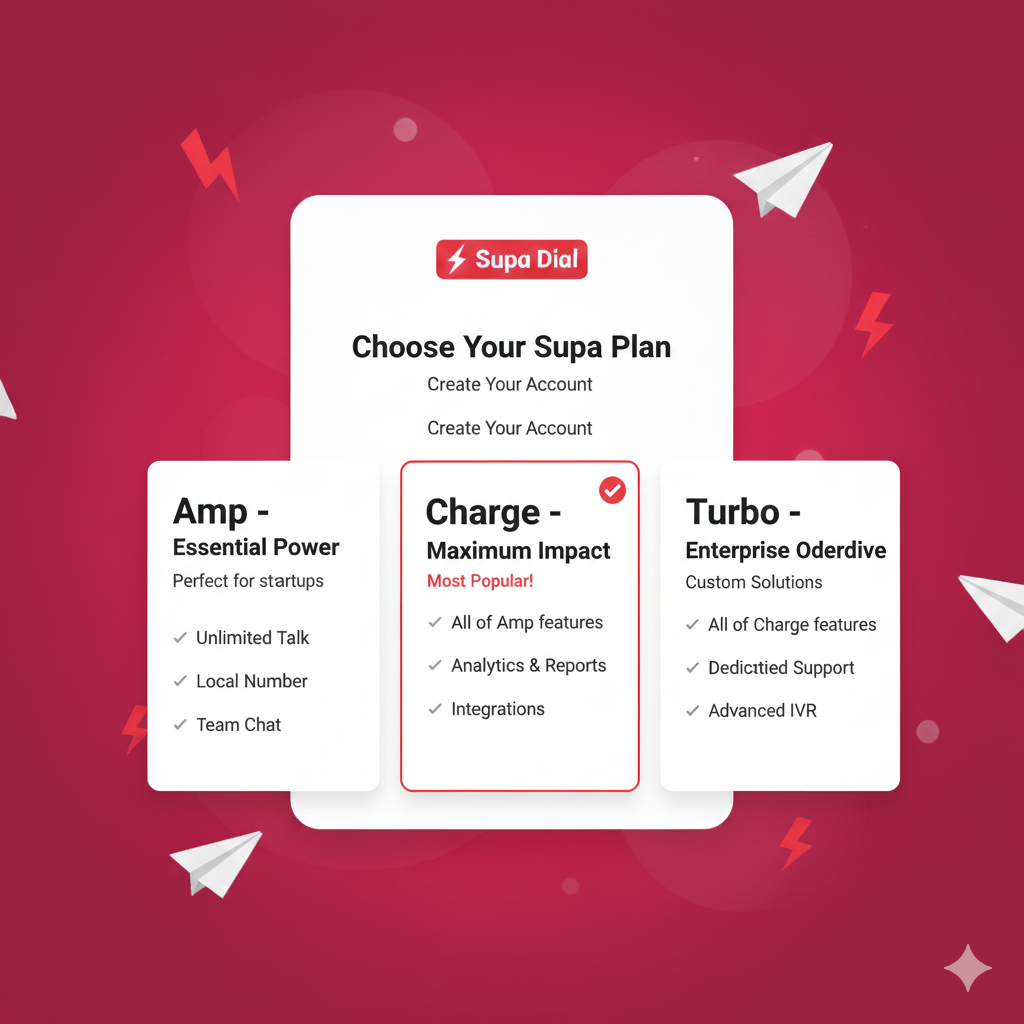
4. Configure your settings
Set up call forwarding, voicemail, or browser-based calling so you can manage calls in the way that’s most convenient for you.
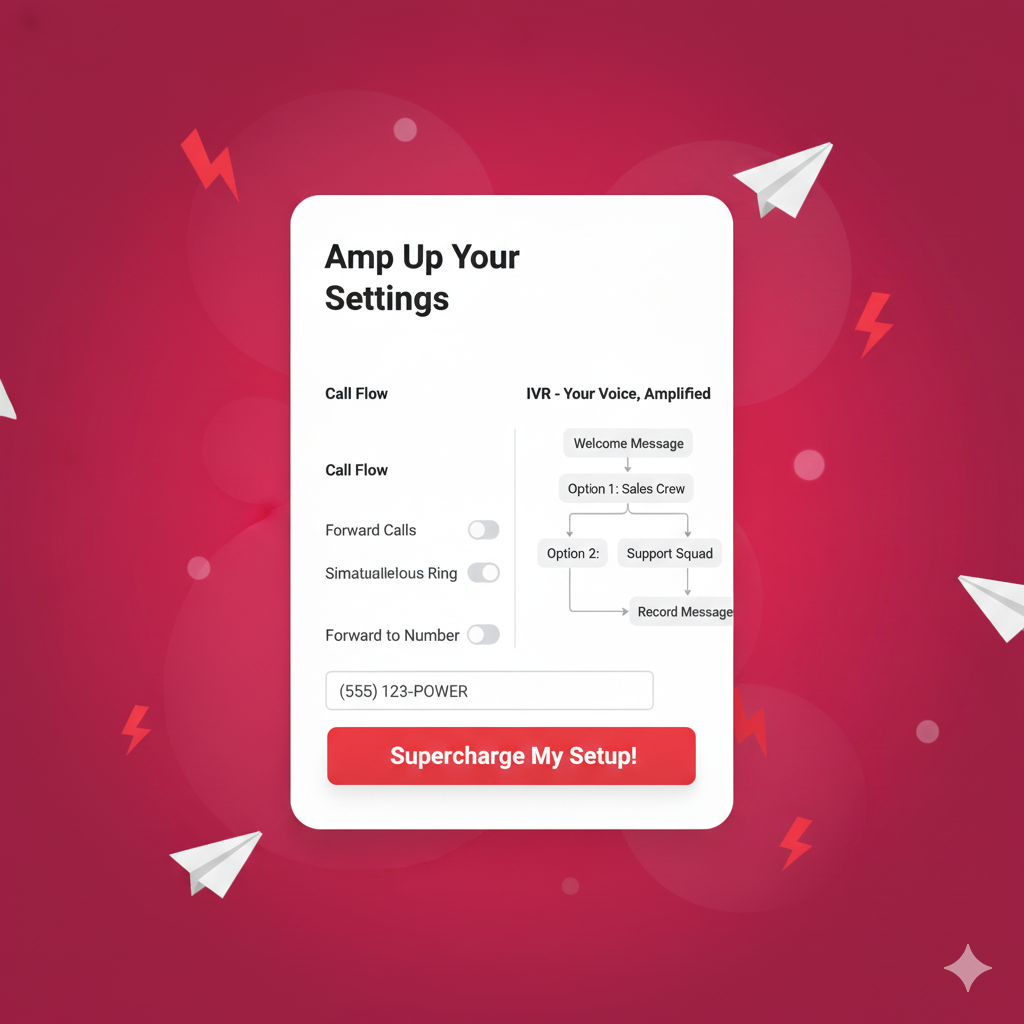
5. Complete payment and activate your number
Once confirmed, your new number is ready to use instantly.
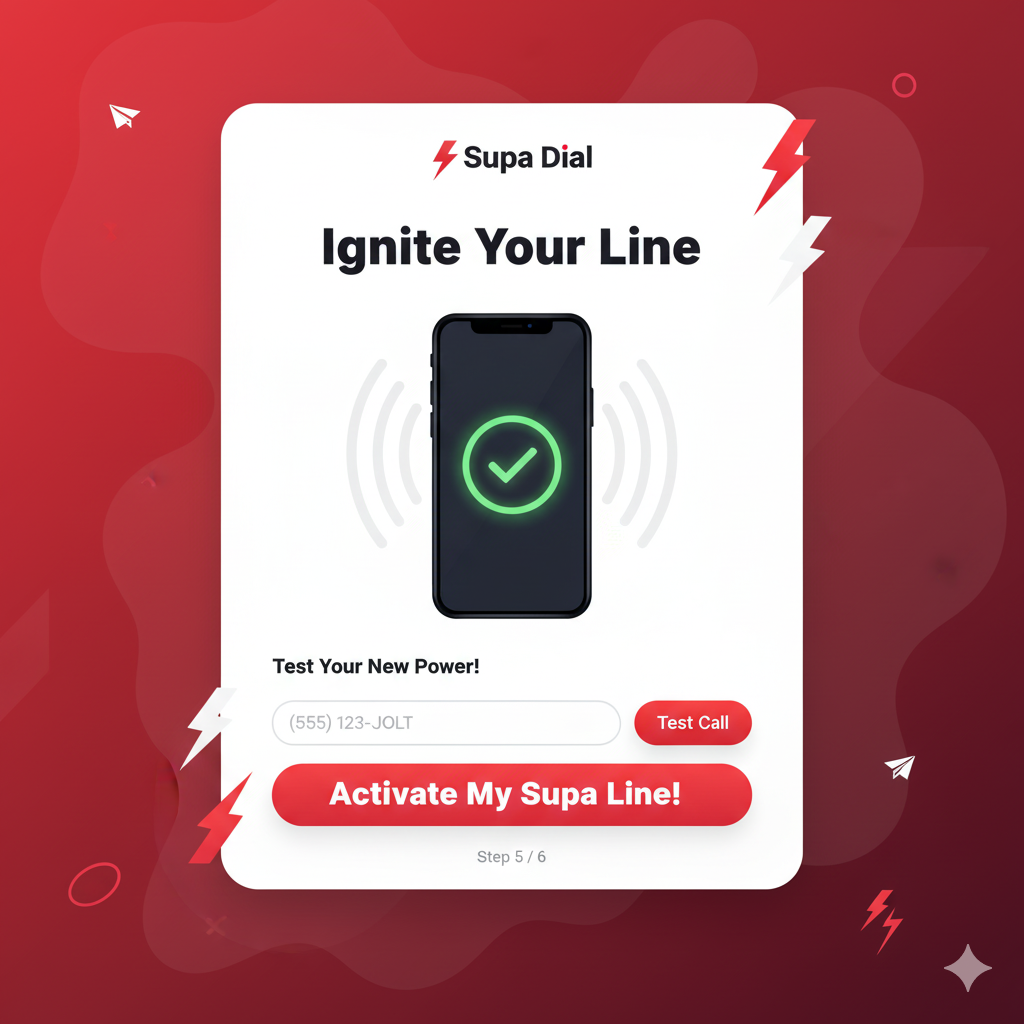
6. Start Using Your Number
Use it for verification or as your main contact method on the app, keeping your personal phone number completely private.
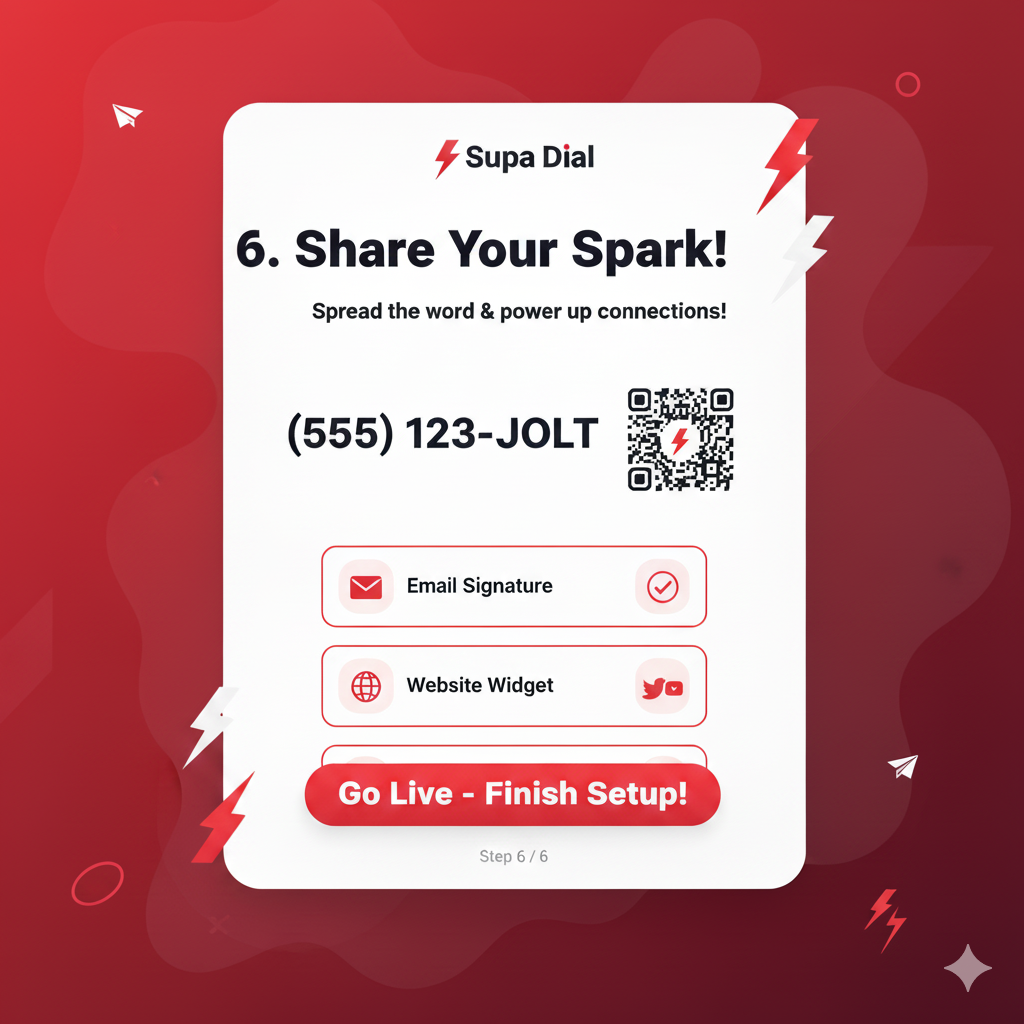
💡 Pro Tip: Some professionals use a separate line just for after-hours or emergencies, giving them total control over accessibility.
Keep Calls in Their Own Lane
Mixing personal and business calls is a recipe for stress, lost time, and missed opportunities. The fix is simple: a second number that keeps your work life sharp and your personal life protected. With Supa Dial, you can set up a dedicated line in minutes, add business hours, auto-replies, and call routing, and finally take control of how people reach you.
Separating your calls is not just about organization; it is about showing up as your best self for every client and still having the freedom to unplug when you need to. Your phone should work for you, not against you.
Frequently Asked Questions
Even with a second number, people still have questions about how it all works. Here are some of the most common ones we hear when it comes to separating personal and business calls.
What is the easiest way to separate personal and business calls?
The easiest way is to use a virtual business number. It runs on the phone you already have, keeps calls labeled, and adds features like voicemail and business hours. Supa Dial makes this setup simple without requiring a second device.
Can I use my personal phone for both personal and business calls?
Yes, but it is not recommended. Mixing calls makes it harder to manage work-life balance and exposes your personal number to clients or customers. A second number keeps both sides of your life organized.
Are virtual business numbers secure?
Yes, when you choose a provider that takes privacy seriously. Supa Dial offers encrypted messaging and secure call handling so your client data stays protected.
Do I need two phones to keep calls separate?
No. That is one of the biggest myths. With a virtual number, you get two lines on one device. You’ll always know whether an incoming call is business or personal without carrying extra hardware.
Are disposable numbers a good long-term solution?
Disposable numbers work for short-term needs like rentals or quick gigs. For long-term business, they are not reliable. A consistent virtual number, like the one you get with Supa Dial, builds professionalism and trust.
